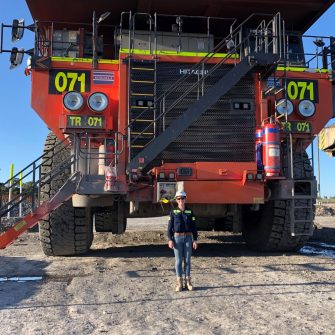Converting diesel engines to run on hydrogen
How a new hydrogen-diesel engine is helping to decarbonise heavy industries in Australia and beyond.

Share this story
To significantly cut the CO2 emissions created by diesel engines, and help reduce Australia’s carbon footprint, a UNSW team led by Professor Shawn Kook, A/Professor Shaun Chan and Professor Evatt Hawkes has successfully developed a hydrogen-diesel direct injection dual-fuel technology, which allows diesel engines to run primarily on hydrogen. Rather than waiting decades for the development and application of a new fuel cell system, existing diesel engines can be retrofitted with the newly invented system – thereby allowing heavy industries to significantly cut their carbon dioxide emissions.
Hydrogen-Diesel Direct Injection Dual-Fuel System developed at UNSW.
The team spent years gaining fundamental knowledge before developing and testing the dual-fuel system, which has been proven to run using 90 percent hydrogen energy and 10 percent diesel as fuel – reducing CO2 emissions by up to 77 percent. Hydrogen is a new green fuel source produced from renewable feedstock and doesn’t produce CO2 when burnt.
“We wanted to accelerate decarbonisation across a range of hard to abate heavy industries such as mining and agriculture,” explains Prof. Kook. “Diesel operators are required to reduce their CO2 emissions, and this is key for their operations – there’s desperate demand for it.”
This demand has been further fuelled by limited diesel alternatives, including the inability of these heavy industries to operate within the electric vehicles.
"They operate high uptime machines, which means the long charging time of battery electric vehicles poses a significant challenge, and hydrogen fuel cell needs to be significantly further developed before exposing it to harsh, heavy-duty applications.”
- Professor Shawn Kook
“The new technology converts existing diesel engines without the need to dispose of them, which provides a great practical benefit as there’s CO2 reduction with minimal action needed."
While the new technology maintains the original diesel injection, it adds a hydrogen fuel injection directly into the cylinder. The hydrogen-air charge is fully controlled before it is ignited by small volume of diesel flames – how exactly these need to be controlled was clearly understood through advanced diagnostics performed in optical facilities prior to the engine testing.
Beyond the lab
To help bring this technology to life, Prof. Kook and his UNSW team have been working closely with a start-up company, DeCarice. Supported by the Trailblazer for Recycling & Clean Energy (TRaCE) and UNSW Founders’ Climate 10x Accelerators program, DeCarice is commercialising the new technology. “Instead of keeping the research as just research, we’ve been really active in bringing this out through a commercialisation vehicle,” he explains. “We think DeCarice is the best way to help us achieve this ambition and accelerate the de-carbonisation of the internal combustion engines.”
While Australia will be the first market Prof. Kook exposes the technology to, he also has plans to go out to international markets as soon as possible. “This has to play out on an international scale,” he explains. “Australia contributes to significant global CO2 emissions, but decarbonisation and implementation of the technology provides great engineering benefits for everyone.”
Currently, Prof. Kook is working alongside DeCarice in preparation for several, in-field demonstration projects. “We have several demonstrator initiatives developed already,” he adds. “Rio Tinto is the TRaCE industry partner who also works closely with us to scale the new technology for future mining applications.”
This collaboration is just one of many rewarding outcomes of Prof. Kook’s ongoing work. “
“I’m surrounded by great colleagues, students and many global industry partners. The Faculty of Engineering provides such a supportive environment.”
- Professor Shawn Kook
Co-founders of start-up DeCarice: Prof Shawn Kook, Goran Bozic.
Converting heavy machinery to hydrogen could mean big savings in CO2 emissions
Forward focused
Having accomplished the decarbonisation of existing diesel engines, the most immediate potential use for Prof. Kook’s research is within industrial locations such as construction, port, agriculture and mining sites. "Our staged approach is to impact Australian non-road diesel machines and then to scale up for on-road diesel engines and international markets to make a bigger impact.”
Share this story
Read more
Get in touch and see what’s possible.
Ask how we can help your business, industry, or market through collaboration.



